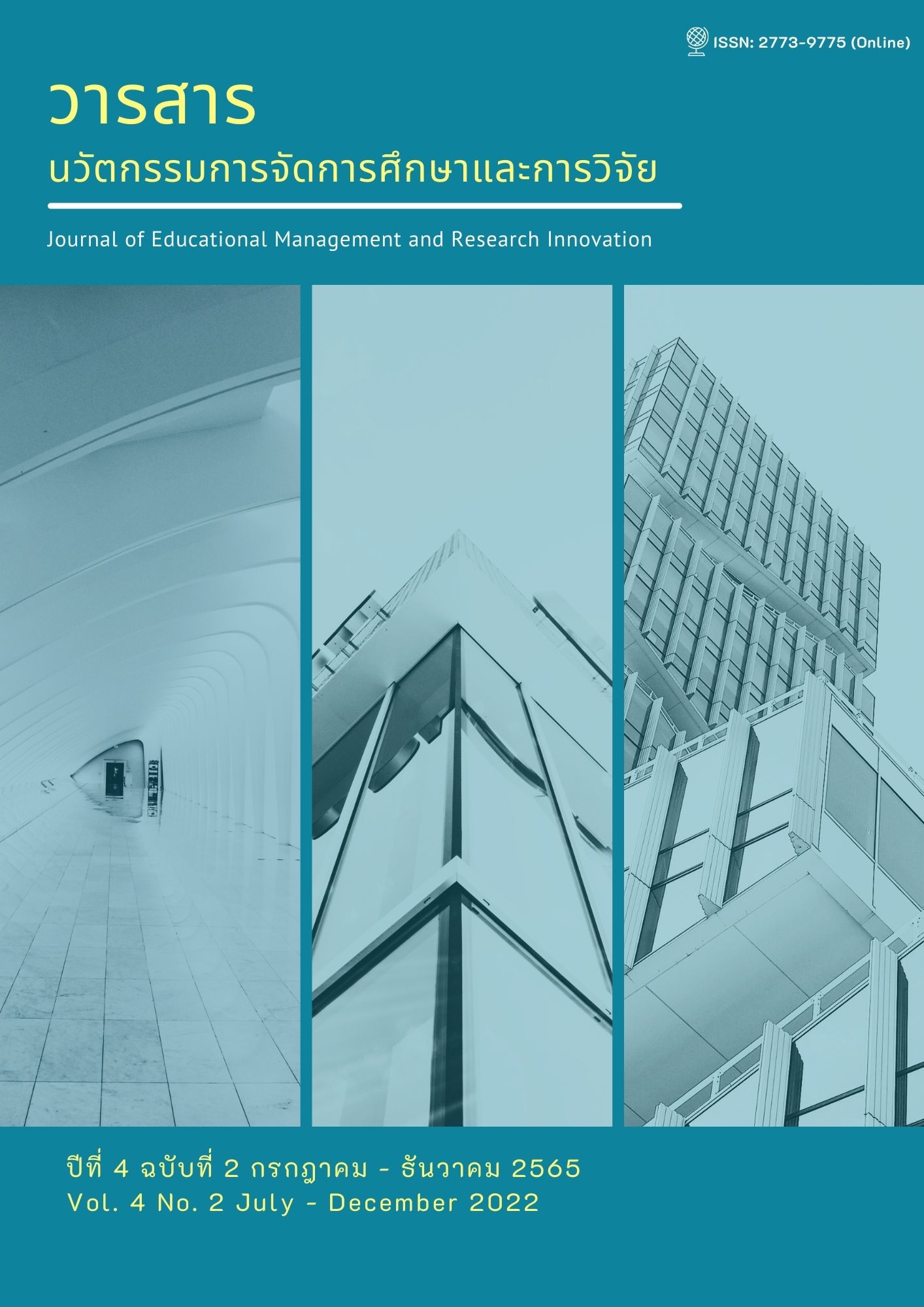ปัจจัยสำคัญที่เป็นแรงจูงใจให้ผู้ใช้บริการมาใช้บริการโรงแรม เพื่อส่งผลดำเนินธุรกิจอย่างยั่งยืน
Main Article Content
บทคัดย่อ
บทความนี้มีวัตถุประสงค์ 1) เพื่อศึกษาศึกษาลักษณะประชากรศาสตร์ พฤติกรรมผู้ใช้บริการ โรงแรม 2)เพื่อศึกษาปัจจัยส่วนประสมทางการตลาด 3) เพื่อเสนอแนวทางการพัฒนาคุณภาพการบริการเพื่อการดำเนินธุรกิจอย่างยั่งยืน การวิจัยครั้งนี้เป็นแบบเชิงสำรวจใช้และเก็บข้อมูลเชิงปริมาณ ประชากรและกลุ่มตัวอย่างที่ใช้ในการวิจัยในครั้งนี้ คือ ผู้ใช้บริการโรงแรมจำนวน 400 คน โดยใช้วิธีการสุ่มแบบสะดวก ผ่านแบบสอบถามอิเล็กทรอนิกส์จากโรงแรมแบรนด์ไทยและต่างชาติในพื้นที่กรุงเทพมหานคร เครื่องมือที่ใช้ในการวิจัยมี 1 ชนิด คือ แบบสอบถาม โดยให้เจ้าหน้าที่ส่วนหน้าเป็นฝ่ายดำเนินการขอและเก็บข้อมูล ทั้งนี้การวิเคราะห์ข้อมูลใช้สถิติพื้นฐาน ผลการวิจัยตามจุดประสงค์พบว่า
- ส่วนสนับสนุนทางการตลาด ในรูปแบบการร่วมมือกับภาครัฐ-โครงการเราเที่ยวด้วยกัน มาเป็นอันดับหนึ่ง โดยมีค่าเฉลี่ย และค่าเบี่ยงเบนมาตรฐาน อยู่ในระดับที่มากที่สุด
- ปัจจัยอื่นๆ ได้แก่ สินค้า สถานที่ ราคา บุคลากร กายภาพและการนำเสนอ และ กระบวนการ มีค่าเฉลี่ย และค่าเบี่ยงเบนมาตรฐาน มากเป็นอันดับรองลงมา ค่าเฉลี่ย ระหว่าง 4.31 – 4.52 และค่าเบี่ยงเบนมาตรฐาน ระหว่าง 0.73 – 1.00
องค์ความรู้จากงานวิจัยนี้พบว่า ตัวแปรส่วนสนับสนุนทางการตลาด มีความสำคัญอย่างมากสำหรับธุรกิจโรงแรม เพราะผู้ใช้บริการใช้เป็นเกณฑ์หลักในการตัดสินใจเข้าใช้บริการ ธุรกิจโรงแรมหรือส่วนที่เกี่ยวข้องสามารถนำผลสรุปนี้ไปปรับใช้เพื่อสนับสนุนและพัฒนาแผนการตลาด เนื่องจากตัวแปรภายนอกทั้ง 7 ของส่วนประสมทางการตลาดมีผลต่อการตัดสินใจของผู้ใช้บริการเป็นอย่างมาก และจากความคิดเห็นส่วนมากของกลุ่มสำรวจต่างแสดงความคิดเห็นว่า เห็นด้วยที่สุดกับการที่ธุรกิจโรงแรมควรใช้หลักการโฆษณาออนไลน์เพื่อการเข้าถึงข้อมูลที่รวดเร็ว และเน้นส่วนลดราคาและสิทธิพิเศษเพื่อเป็นแรงจูงใจแก่ผู้ใช้บริการ เป็นต้น
Article Details

อนุญาตภายใต้เงื่อนไข Creative Commons Attribution-NonCommercial-NoDerivatives 4.0 International License.
เอกสารอ้างอิง
Anantnakarakul, S. (2021, June 10). What is Online Marketing?. PRIMAL. Retrieved May 20, 2022, from https://www.primal.co.th/marketing/what-is-online-marketing/
Arwatchanakarn, P., Roungkun, S., & Hassdin, S. (2021). The Potential of “We Travel Together” Project: From the Perspective of Thai Tourists and Tourism Business Operators in Chiang Rai Province. Journal of Humanities and Social Sciences, 10(1), 75-90.
Bohrnstedt, G. W., & Knoke, D. (1988). Statistics For Social Data Analysis. Illinoi: F.E. Peacock Publishers.
Choovongvan, W. (2017). Behavior and Motivation Affecting a Decision Making in Traveling and Choosing Accommodation of Big Bike Users in Amphur Hua Hin, Prachuapkhirikhan Province(Master’s Thesis). Silpakorn University.
Chulaphan, P. (2020, December 29). Backtracking 'We Travel Together', a great project...but almost collapsed because of a scam. Bangkokbiznews. Retrieved May 11, 2022, from https://www.bangkokbiznews.com/business/ 914544
Cortina, J. M. (1993). What Is Coefficient Alpha? An Examination of Theory and Applications. Journal of Applied Psychology, 78(1), 98–104.
Dulyasatien, W. (2016). Factors Affecting the Performance of Large Hotels Business in Thailand. Veridian E-Journal, Silpakorn University (Humanities, Social Sciences and Arts), 9(2), 2057-2070.
Dutse, A. Y., & Ayuba, B. (2015). Application of Marketing Mix Strategies in Hospitality Business: A Study of Hotels in Abuja, FCT-Nigeria. Retrieved August 7, 2022, from https://www.researchgate.net/publication/293336008_Application_of_Marketing_Mix_Strategies_in_Hospitality_Business_A_Study_of_Hotels_in_Abuja_FCT-Nigeria
GSB Research. (2020, July 8). Hotel Business. GSB Research. Retrieved May 7, 2022, from https://www.gsbresearch.or.th/gsb/published-works/7865/
Kamolsiriwat, S., & Povatong, B. (2021). Adaptation Strategies to COVID-19 on The SHA Standard Hotels of Entrepreneurs in Bangkok Metropolitan Area in 2020. Sarasatr e-Journal, 4(3), 650-663.
Krungsi Guru. (n.d.). Sustainable Income Theory. Royal Speech That Enhances The Lives Of All People. Retrieved May 20, 2022, from https://www.krungsri.com/th/plearn-plearn/sustainable-income-theory-for-a-better-life
Kunlaya, V. (2006). Statistical Analysis: Statistics for Decision Making. Bangkok: Chulalongkorn University Press.
Lunkam, P. (2019, July 31). Business/Industry Outlook 2019-2021: Hotel Business. Krungsri Research. Retrieved May 19, 2022, from https://www.krungsri.com/getmedia/ad4c358e-629a-4a7d-86d9-8c37084c41f1 /IO_Hotel_190731_TH_EX.pdf.aspx
National Statistical Office. (2017). The Survey of Travel Behavior of Thai Tourists 2017 (In the year 2016). National Statistical Office. Retrieved May 19, 2022, from https://bit.ly/3x33GFp
Ongiem, A., & Vichitvejpaisal, P. (2018). Validation of the Tests. Thai Journal of Anesthesiology, 44(1), 36-42.
Pongphadit, P. (2016). Shopping Motivations, Information Acquisition, and Store Entry Decisions for a Bakery Shop(Master’s Thesis). Burapha University.
Rocketmarketing group. (2020). 5 Reasons Why Customer Loyalty Programmes Are So Important. Rocketmarketing group. Retrieved May 3, 2022, from https://rocketmarketinggroup.com.
Rovinelli, R. J., & Hambleton, R. K. (1977). On The Use of Content Specialists in The Assessment of Criterion-Referenced Test Item Validity. Dutch Journal of Educational Research, 2, 49-60.
Sasikarn, P. (2016). Marketing Mix (7ps) Toward Consumer Decision of Using Beauty Clinic: Case Study of Teenage Consumer Decision Making of Using Beauty Clinic Around Burapha University. Retrieved July 26, 2022, from http://digital_collect.lib.buu.ac.th/dcms/files/ 57740006.pdf
SCB. (n.d). Open The Digital Marketing Scriptures, A Special Formula for Hotel Business. Retrieved June 10, 2022, from https://www.scb.co.th/th/personal-banking/stories/business-maker/digital-marketing-for-hotel.html.
Yasamut, T. (n.d.). Learn the story behind All Member’s Success through the Loyalty Program. Dgti8. Retrieved May 19, 2022, from https://www.dgtl8.com/loyalty-programs-case-studies/


